PM Modi extends nationwide lockdown till May 3. More than 100,000 fishers still stranded in their boats off the Maharashtra coast
The 21-day lockdown, announced on March 24, has now been extended to 40 days till May 3. Over one lakh migrant fish workers, stranded in their boats in the Arabian Sea, have received no help from the government. The fishing community’s demand for a special economic package is also pending

The 21-day nationwide lockdown, which was to end on April 14, has now been extended till May 3. This was announced by Prime Minister Narendra Modi when he addressed the nation on the morning of April 14. Detailed guidelines on the extended lockdown are expected to be issued on April 15.
“Till April 20, all districts, localities, states will be closely monitored, as to how strictly they are implementing norms. States which will not let hotspots increase, they could be allowed to let some important activities resume, but with certain conditions,” said Modi. “In case of any positive development in any particular area or district, we can give a conditional concession from April 20. In case of any violation, development of any new hotspots, those concessions will be rolled back in those areas,” he added.
The news of the lockdown extension, which was expected as demanded by the state governments, has increased the worries of Kiran Koli of Maharashtra Machhimar Kriti Samiti, who is struggling daily to feed and keep safe over a lakh migrant fish workers stranded in their boats off the Maharashtra coast due to the lockdown in response to the coronavirus (COVID-19) pandemic.
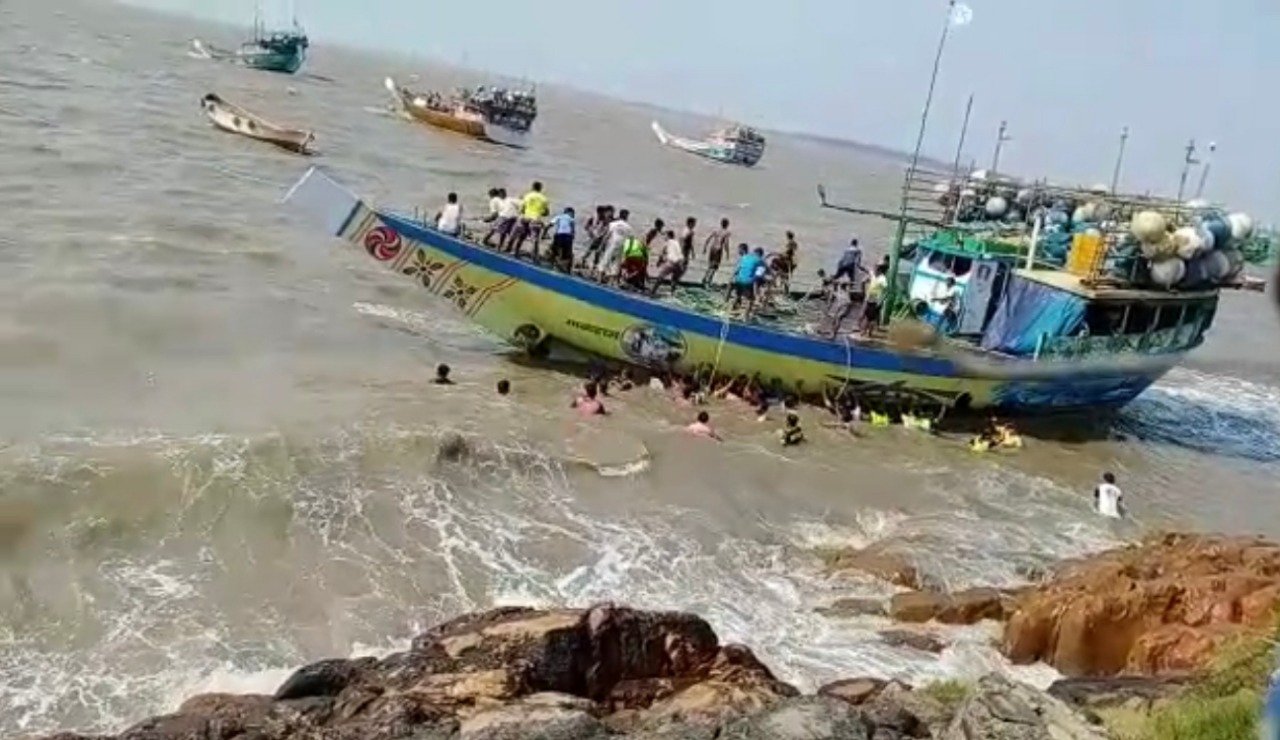
On April 2, Gaon Connection had reported the plight of at least 100,000 fish workers who were at sea when the first phase of the nationwide lockdown was announced on March 24. These migrant fish workers, mostly from Uttar Pradesh, Bihar and Jharkhand, were unable to return to the coast as all transport has been shut and there is no way for them to return to their home states.
For the past three weeks, they are living in their boats in the Arabian Sea. All pleas for help have fallen on deaf ears.
“In spite of approaching various authorities and writing letters to the district collectors, no help has come from the government for these stranded fishers. For the last three weeks, we are supplying them dry ration and drinking water in their boats in the Arabian Sea,” Koli told Gaon Connection.
“We have also written to the government to provide some transport facility so that these migrant workers can get off the boats and return to their home states. So far, we have received no reply,” he added.
This is not all. While the fishers are suffering huge livelihood losses, the state government is yet to release Rs 187 crore diesel subsidy it owes to over 9,310 fishers in Maharashtra. This amount is pending for the past four to five years.
In the wake of COVID-19 and the resultant loss of livelihood, the Maharashtra Machhimar Kriti Samiti has demanded food grains for fisher families for the next three months. It has also demanded a cash loan.
“When the next fishing season starts in August this year, the government must offer each fisher Rs 5 lakh cash credit loan. This should be interest-free,” said Koli. “Fishers have lost out on their livelihood and have no money to repair their fishing boats and other gears for the next fishing season. If they are not offered this loan, fishers will die in penury,” he added.
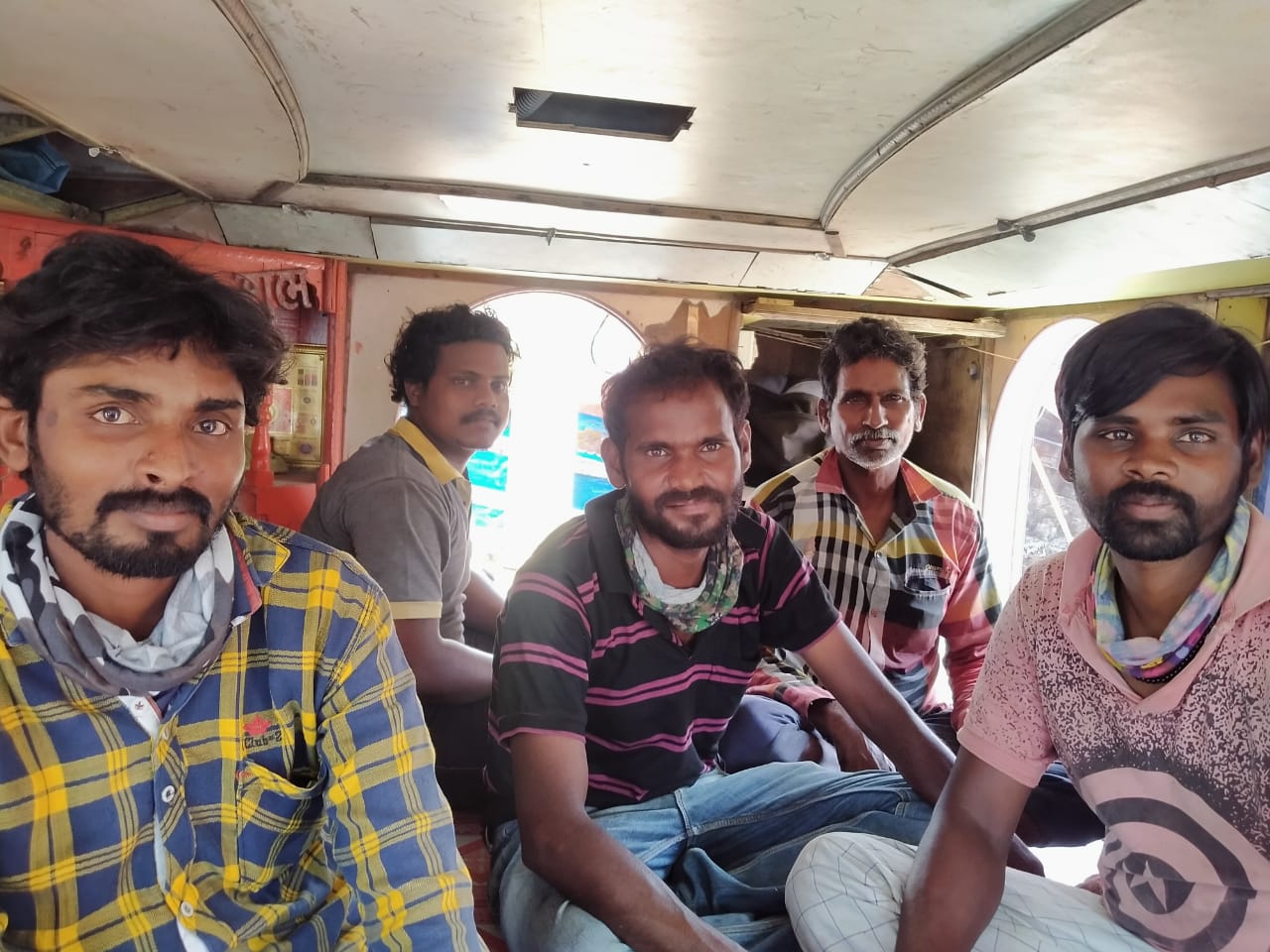
Interestingly, on April 10, two weeks after the nationwide lockdown came into force, the Union Ministry of Home Affairs issued 5th addendum to its earlier order dated 24.03.2020. This addendum exempted from the lockdown “operations of fishing (marine)/aquaculture industry, including feeding and maintenance, harvesting, processing, packaging, cold chain, sale and marketing; hatcheries, feed plants, commercial aquaria, movement of fish/shrimp and fish products, fish seed/feed and workers for all these activities.”
It went on to note “social distancing and proper hygiene practices must be ensured in each of the above activities….”
However, the fishing community is not gung-ho about this addendum.
Every year, there is a 61-day fishing ban around the monsoon to protect the marine fishing wealth. To this effect, in March 2017, the Central government issued a notification on the ‘uniform ban on fishing by all deep-sea fishing vessels in the Indian exclusive economic zone (EEZ) beyond the territorial waters on the East Coast and the West Coast’.
The 2017 notification specified a 61-day fishing ban on both the coasts of the country, including Andaman & Nicobar Islands and Lakshadweep, “for conservation and effective management of fishery resources and also for sea safety reasons”. All fishing activities are banned during this period except traditional non-motorised boats, which can continue fishing.
“On the East Coast of the country, this ban comes into force from April 15 till June 14, whereas on the West Coast, it starts from June 1 and ends on July 31,” T Peter, the general secretary of the National Fishworkers’ Forum, a federation of state-level trade unions in India, told Gaon Connection.
In the light of the April 10 addendum, the fishers on the West Coast still have time till May end to resume fishing activities, but the fishing ban has already come into force on the East Coast of the country. The livelihoods of fishers on the East Coast have taken a serious hit and, so far, no financial help has come from the government.
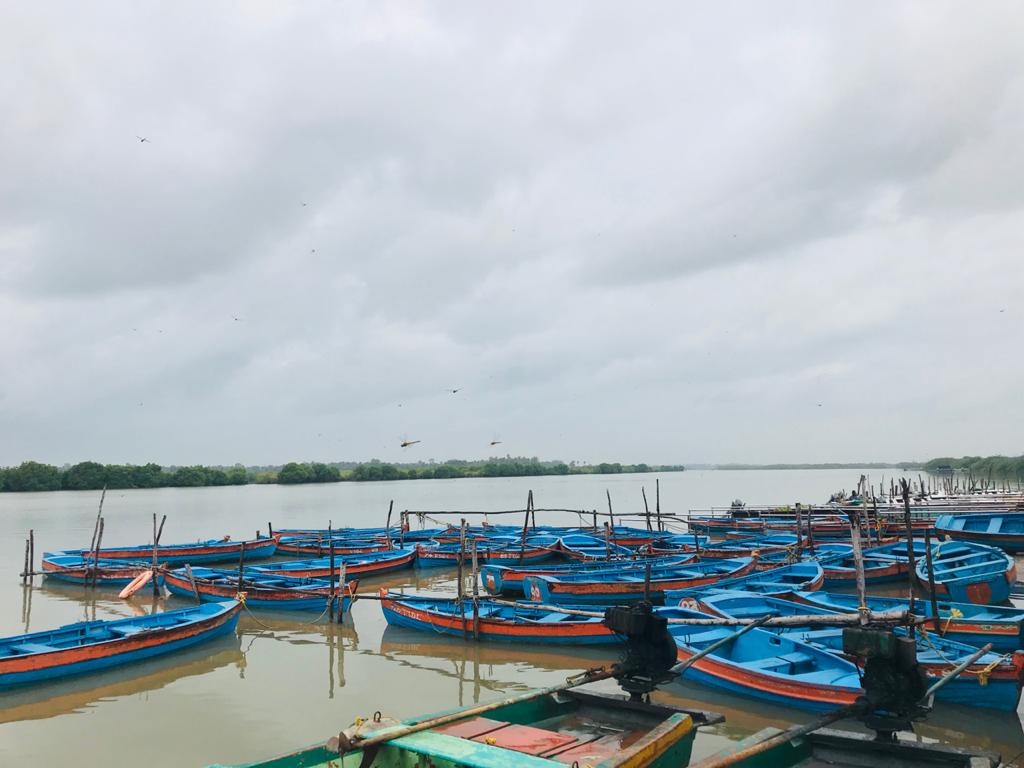
“Unlike the West Coast, where the annual fishing ban starts on June 1, our fishing ban period has already started. The Home ministry’s April 10 circular exempting fishing activities from the lockdown makes no difference to us,” K Allaya of the Orissa Traditional Fish Workers Union (Odisha) told Gaon Connection.
“We have already lost out on a month’s livelihood due to coronavirus. And, the next two months, fishers cannot go to the sea due to the ban period. How do we survive?” he asked. “We have demanded an exemption from this year’s fishing ban for fishers on the East Coast in Odisha. Except for trawlers, the government must allow other fishers to practice fishing in the ban period,” he added.
Odisha has 8,500 active fishers. The state has 19,000 mechanised large fishing boats; and about 7,000 traditional small fishing boats, of which 3,500 are non-mechanised (without an engine). “This year, the government should exempt all the traditional fishing boats — mechanised or non-mechanised — from the two-month ban,” Allaya reiterated.
Interestingly, this is something Kerala has already been following. “In Kerala, only trawlers are banned during the two-month fishing ban period. Other fishing boats continue with their regular activities,” informed Peter, who is based in Thiruvananthapuram.
“We fishers believe in protecting our marine wealth and the environment. But there is no scientific basis of the complete fishing ban for two months. Trawlers are involved in destructive fishing activities and need to be restrained,” he added.
This year, in response to COVID-19, Tamil Nadu fishers are also demanding resuming fishing activities from May 15, instead of the regular June 15.
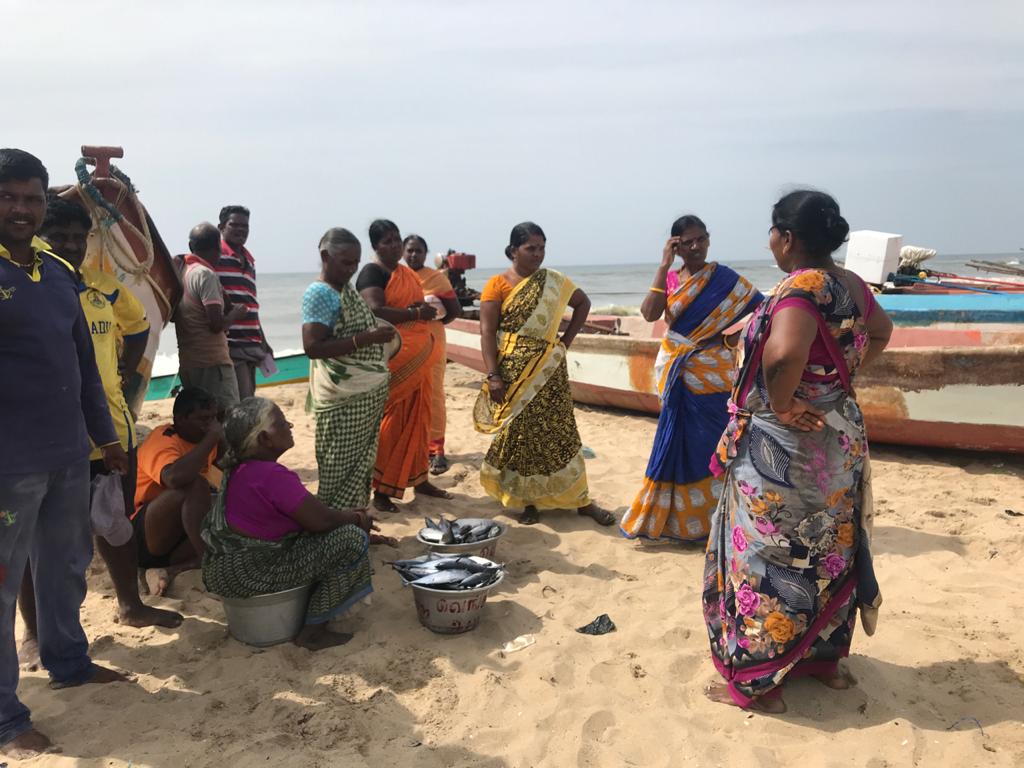
On March 24, soon after Modi announced the 21-day nationwide lockdown, National Fishworkers’ Forum shot off a letter to Pratap Chandra Sarangi, minister of state, Union Ministry of Fisheries, Animal Husbandry & Dairying demanding a special economic package to support the fishers in the country.
Among other things, the Forum has demanded Rs 10,000 per fisher family for three months period to be paid in advance. It has also demanded an adequate supply of ration with cooking fuel to the fish workers.
“Fishing community is more than the fishermen who go to the sea to catch fish. A large number of women are involved in fishing activities,” said Allaya, who is also the vice-president of the National Fishworkers’ Forum. “For such fisherwomen, we have demanded Rs 3,000 per month for a three-month period,” he added.
Of the total 16 million fishers and fish workers in the country, almost half (5,570,217) are women.
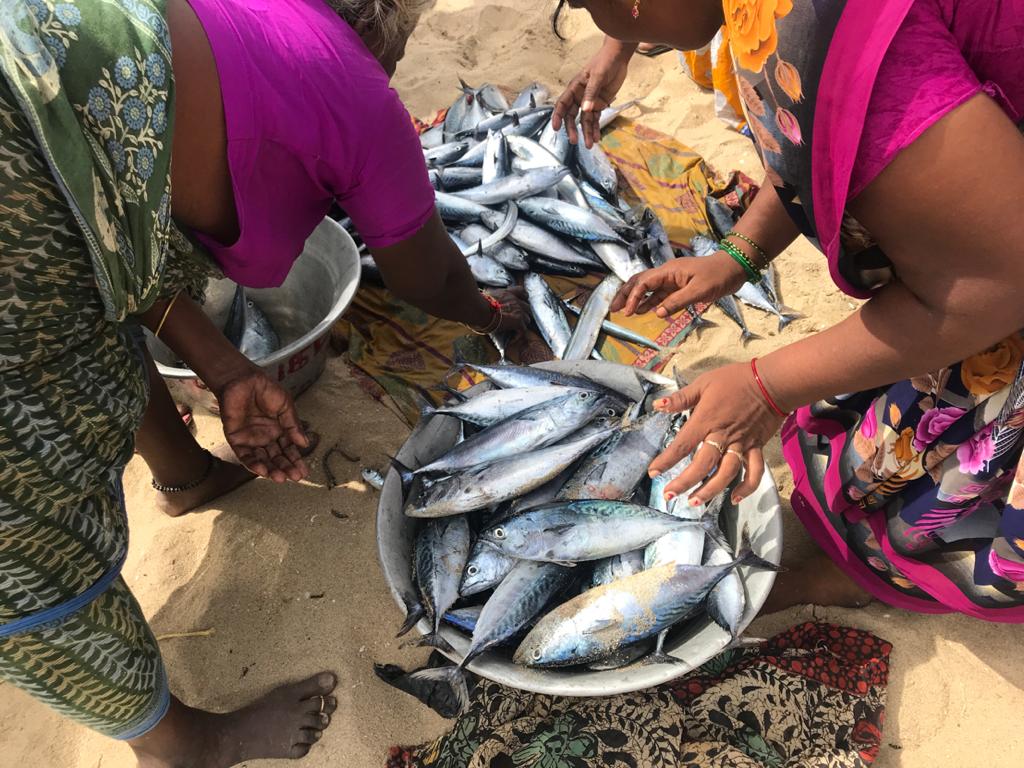
Meanwhile, in the coastal state of Andhra Pradesh, the fishing community has demanded a monthly compensation of Rs 15,000 per fisher family for three months period. At present, a compensation of Rs 5,000 per fisher family is provided during the fishing ban period.
“Fishing is a semi-skilled activity and the legal wage for such an activity in the country is Rs 371 per person per day. Thus, each fisher going to the sea should receive this much daily wage,” Debasis Paul of the Democratic Traditional Fishers and Fish Workers Forum, Andhra Pradesh told Gaon Connection.
“In any fishing family, apart from the men who go fishing, women are also involved in fishing activities. Each such fisherwoman should be paid at least half the legal wage of Rs 371 a day. Adding all this comes to a compensation of Rs 15,000 per fisher family per month. And, this should be provided for three months period,” he added.
So far, apart from issuing the addendum on April 10, the Central government has not offered any financial help to the fishing community.
“Traditional fishers are like daily wagers. They go to sea to catch fish and earn a living. Without a livelihood, how do we sustain and feed our families?” asked Paul.
Clearly, in these times of a health crisis, which has snowballed into a livelihood crisis, the government needs to do more than just issue addendum.
Read the first part of the story published on April 2, 2020 here

